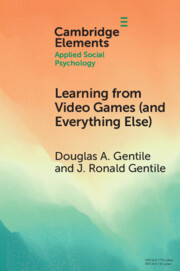Refine search
Actions for selected content:
2 results

Learning from Video Games (and Everything Else)
- The General Learning Model
-
- Published online:
- 01 December 2021
- Print publication:
- 23 December 2021
-
- Element
- Export citation
Appendix II: - List of Scales and Assessment Instruments
-
- Book:
- Impulse Control Disorders
- Published online:
- 06 July 2010
- Print publication:
- 08 February 2010, pp 280-296
-
- Chapter
- Export citation
